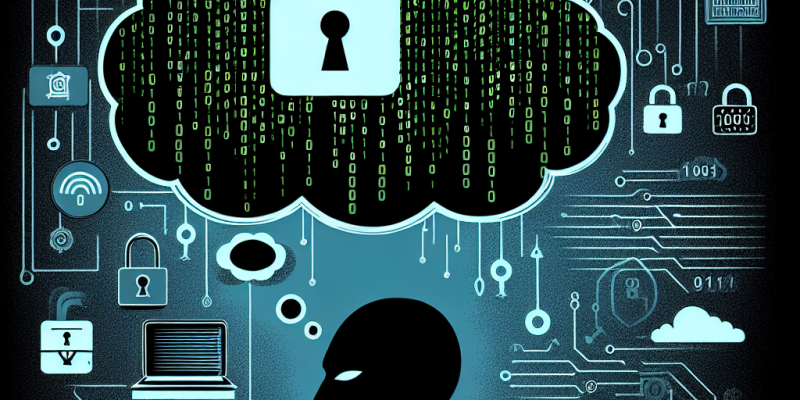Inside the Mind of a Hacker: An Interview with a Former Cybercriminal

Inside the Mind of a Hacker: An Interview with a Former Cybercriminal
In a world increasingly driven by technology, the threat of cybercrime looms larger than ever. While traditional crime often has visible perpetrators, the digital underworld thrives on anonymity and subterfuge, making it difficult to comprehend the motives and mindset of those who engage in these illicit activities. To gain insight into this shadowy realm, we spoke with Alex, a former hacker who transitioned from a life of cybercrime to one of advocacy and cybersecurity empowerment.
The Lure of the Digital Underworld
Alex entered the hacking scene in his late teens, intrigued not just by the technical aspects but by the rush that accompanied breaking into secure systems. “I was fascinated by the challenge,” he explained. “The internet felt like this vast, unregulated frontier where you could test your skills against other intelligent adversaries.” This initial intrigue quickly spiraled into a series of illicit activities.
What fueled this behavior? Alex described a blend of factors: curiosity, the thrill of risk, and a strong rebellious streak against conventional authority. “At that time, hacking felt like a form of escapism. Society had its rules, but in the digital world, I could create my own.”
The Psychology of Hacking
During the interview, Alex spoke candidly about the psychological factors that drive hackers. “There’s a certain ego boost that comes from outsmarting security measures. Some hackers see themselves as modern Robin Hoods—taking down corporations perceived as corrupt or greedy,” he noted. However, he acknowledged that not all motivations are noble. Financial gain, revenge, and sheer boredom can also drive individuals craving the adrenaline rush that hacking provides.
Moreover, the hacker community fosters a sense of belonging. Online forums serve as breeding grounds for camaraderie and knowledge-sharing, teaching newcomers the ropes while reinforcing the idea that they are part of a unique subculture. “It’s a double-edged sword,” Alex reflected. “You learn so much, but those lessons often come at the expense of ethics and legality.”
Reflecting on Past Actions
As our conversation turned toward the ethical implications of hacking, Alex expressed remorse for his past. “Looking back, I realize how many lives I negatively affected, even if my actions seemed harmless at the time. Data breaches can ruin people’s lives.” His experiences with law enforcement and the subsequent consequences solidified a moral awakening. After being prosecuted and serving time, he was compelled to confront the damage that his actions inflicted on others.
“I was confronted with the fact that I wasn’t just breaking into machines; I was violating people’s trust and security,” he admitted. This realization set him on a path toward restitution: dedicated ethical hacking and cybersecurity advocacy.
Turning the Tide: From Hacker to Advocate
Today, Alex leverages his skills for positive change. Working in cybersecurity, he spends his days identifying vulnerabilities and helping organizations secure their data. “I want to be part of the solution,” he said earnestly. “If I can use my experiences to help others protect themselves, that makes it all worthwhile.”
He also highlights the importance of education in combating cybercrime. “Many people don’t realize how vulnerable they are. Awareness—understanding phishing attempts, recognizing unusual behavior online—is so critical.” For Alex, empowering individuals and organizations with knowledge is a key defense against the lurking threats online.
The Future of Cybercrime
As we wrapped up our conversation, I asked Alex about the future of hacking and cybercrime. He noted that as technology advances, so do the techniques employed by cybercriminals. With the rise of artificial intelligence and the Internet of Things (IoT), new vulnerabilities will emerge. “We are constantly playing catch-up,” he explained. “It’s a never-ending battle between security and exploitation.”
Alex ended on a hopeful note, underscoring the ongoing efforts in cybersecurity communities and the importance of collaboration among ethical hackers, law enforcement, and tech companies. “We have to work together to build a safer online world. It’s not just about preventing attacks but also about creating a culture of trust and responsibility.”
Conclusion
Engaging with someone who has navigated the complexities of the cybercriminal mind offers a unique perspective on the motivations, challenges, and transformations that can occur. From the thrill of the hack to the heavy burden of regret, Alex’s journey serves as a powerful reminder that even those who stray into the depths of cybercrime can find their way back, using their skills for a greater good. Through awareness, collaboration, and education, the fight against cybercrime can be a collective effort, ensuring a more secure digital future for all.














